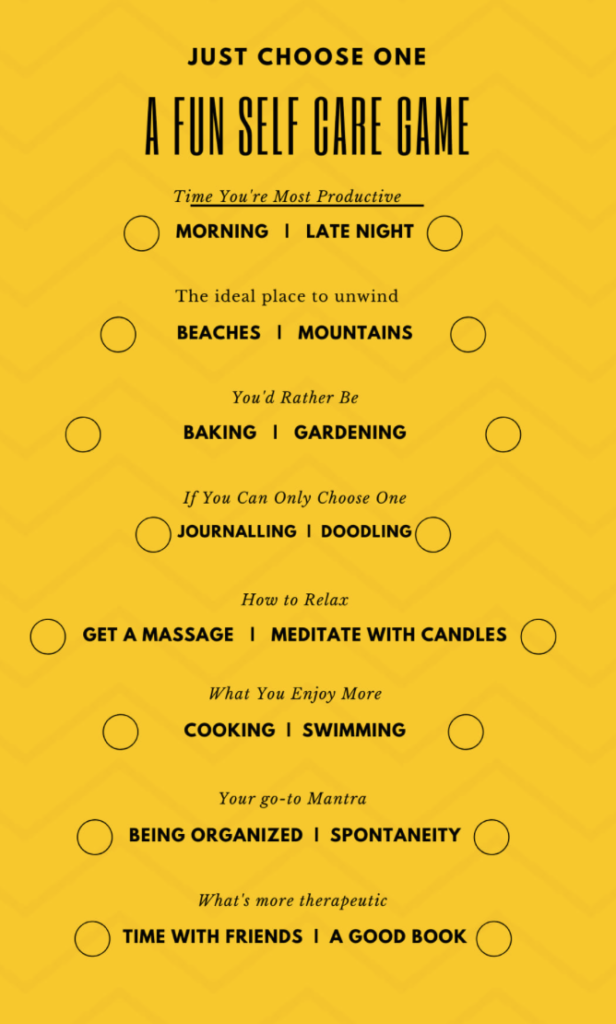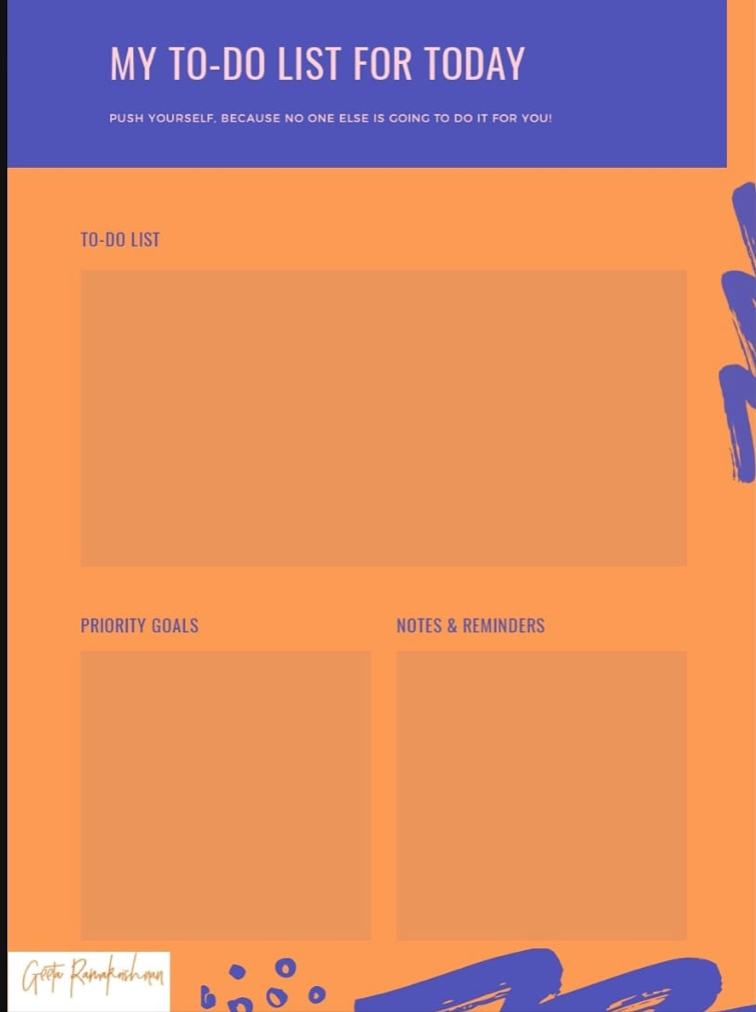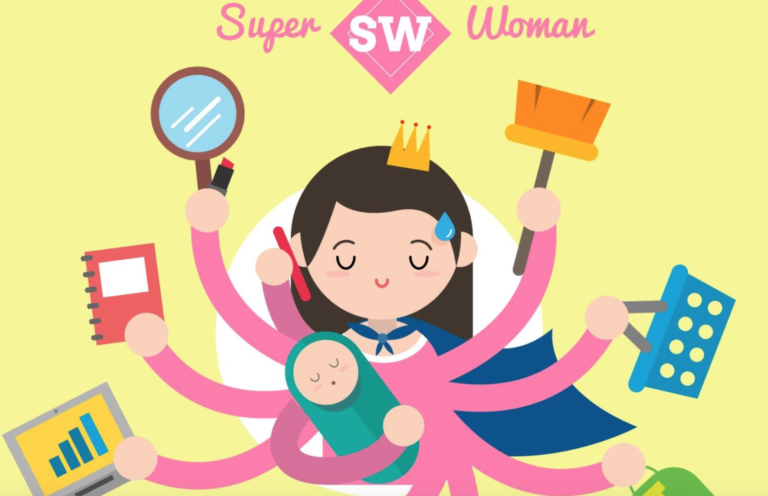Try this super fun self care game to relax and unwind on this work filled Wednesday! What are your picks?!

Geeta Ramakrishnan
By Geeta
By Geeta

If you want to get into the habit of being more efficient and work smart, keep a ‘to-do’ sticky note pad next to your breakfast tray. You brain will get into the habit of prioritizing what is important for that day and make some notes! You can use this specially curated to do list for more productivity and priority setting, coupled with reminders!

By Geeta

How’s The Josh? Season 2, Episode 8
Podcast with the amazing, energetic Omkar Chaudhari, chatting on change management. Links as attached…
https://applinks.kukufm.com/vAxeeJjXxhvZFUTf6
https://hubhopper.com/podcast/hows-the-joshseason-2/312405
https://radiopublic.com/hows-the-joshseason-2-8jZgg5/episodes
https://www.stitcher.com/podcast/hows-the-joshseason-2?refid=stpr
By Geeta

How women can take a moment to pause and reduce stress : An article from ThriveGlobal
Sometimes all it takes is to physically take a step back, inhale deeply and exhale slowly. Or take time out for coffee-breaks with friends, a movie, perhaps. Just learn to let go, to forgive.
It may be debatable, but I believe women have to work twice as hard as men in several aspects of life ranging from personal to professional to sustain in a world full of competition and stress.
Women wear multiple hats and have acquired the skill to juggle them successfully. We are daughters, mothers, professionals, managers, homemakers, dreamers, achievers. We want to be seen as strong and confident in all that we do and that comes at a cost—our self-esteem.
Soon, resentment and stress become a part of life. We need to learn to step back, pause and introspect. While navigating through multiple roles in life, our confidence takes a beating because of the stress we are subjected to. Therefore we need to give ourselves time and validation to sustain our confidence level.
So how do we identify a problem when it has become a habit?
Certain facets of our life may not feel right. But we have accepted them as a way of life. We have been conditioned over generations about how a woman should come across as. When we were young, our mothers unconsciously led us to believe that we must maintain a demure image and not argue, fight or talk too loud.
We grow up accepting a lot of ‘inequalities’ or have to work hard and fight against such ‘norms’. Although men have different qualities than women, both important and useful, we bring our own unique attributes to this world, our society, and our family.
We can be fantastic nurturers, we are emotionally stronger, we are likely to have better focus, we turn out to be excellent managers and have an edge when it comes to offering greater attention to details.
It helps us to be aware, accept as well as focus on our uniqueness and derive our strength from it rather than complaining about or resenting it.
What will help us in our quest to be the ‘ideal’ women and be seen as achievers and allow us to dream big?
Does multitasking overwhelm us instead of boosting effectiveness? Perhaps, it may be harder for us to climb the corporate ladder.
Can we change the male-dominated trend in this world by being aggressive or by complaining? Maybe we are devoting more time to our family and our children which is undoubtedly a lot more than our spouses.
Are we giving any time or value for ourselves? Are we putting ourselves in constant stress?
As a woman, a wife, a mother and a professional, we constantly struggle to give our best to the different roles we play in life. We often think we can handle the children better and allow the strain of child-rearing to rest longer on our shoulders. We often do not expect, let alone ask for help in household responsibilities.
To be seen as equally efficient in the office, we take up more work and work for longer hours. If there is physical or emotional abuse, we may end up tolerating it due to the lack of a better option. If we choose to fight we could be termed aggressive.
Where is the balance? How do we cope with all this stress?
While smoking and drinking socially may not be harmful, as an escape from stress, it could result in addiction.
We cope with stress by procrastinating, denial or ignoring the problem at hand and end up playing blame games. My maid is often late and irresponsible; my office staff never gives the report on time, why can’t my children be more responsible?
The list is endless.
Our body needs rest when certain symptoms arise. These could be aches and pains for which the doctors have no remedy. It might be genetic or it could be just a niggling headache.
How many times are we in denial when there is physical or emotional abuse? We might want to ignore and wish the problem away as we have neither time nor energy to deal with them now.
Yes, it takes courage. It takes courage to say ‘No’. Yes, there is fear. But everything we want is often on the other side of fear.
How to change
Now that we recognise the problems and pitfalls, we want to change. But most of us do not know how to change. Often, all it takes is physically taking a step back, inhaling a deep breath and exhaling it out slowly.
Sounds so easy, doesn’t it? Yet it is potent. These few seconds are enough to allow our brain to move from its default 24/7 ‘stress’ mode to a ‘creative’ window.
All the solutions are within us, right there in the creative side of our brain. This method of stepping back and observing ourselves is an effective first step.
What are the other tools to help us access our creative side, other than a few slow breaths?
If we, as women, want to give our best in all the multiple roles, we first need to give ourselves ‘Me Time and Me Space’. If we don’t pace ourselves, take a pause, validate ourselves, how can we add value to others, be it in our personal or professional life?
Take time out for coffee-breaks with friends, a movie, perhaps. It is a good platform to share, even bitch a little and laugh our heads off.
Learn to let go, to forgive. Forgiveness is only complete when we forgive and forget. It lets the big burden off our shoulder.
Empathy helps one look at issues from another perspective, while not necessarily agreeing with it. Try to understand a colleague’s issues, sometimes beyond work. It will lead to healthy conversations, even if it is a difficult one.
Looking for and focusing on even the smallest positive aspect in our spouse, our children, and appreciating them is a great step forward to building that solid trust.
All these steps help us to define our boundaries better and make it easier to say ‘No’ and be assertive and confident. It boosts our self-esteem, your image, and self-worth.
The more we exercise these mindful practises, the more we will access our creative brain and find that perfect balance. It helps us be in choice, from resentment and stress to happiness and excitement, seeking opportunities in challenges. It allows us to blossom into strong, confident women with abundant energy, sharing that happiness while nurturing others, while we also unleash success in whatever we want to do.
Published on June 23, 2020
By Geeta
By Geeta
By Geeta
By Geeta

Experiencing negativity during work from home phase? Here’s how to minimise it
Article appeared in the following online portal : Pinkvilla.com and Womenfitness.org
Since the announcement of lockdown, many of us are working from home but there are several challenges as well. Read on to know how to tackle negativity.
Workplace negativity is an increasing problem in today’s times and often results in loss of confidence, control and harmony among peers. This lockdown has changed lives, changed people, and transformed both personal and professional life to a great extent and this negativity can significantly impact morale and productivity.
To help curb this problem, here are seven ways by which you can minimize negativity in your workplace.
Praise and recognition
The power of a few kind words or praise is remarkable and can uplift anyone’s mood and motivate them to work harder and better. One can’t always tell how the other person is feeling, but a few kind words can make anyone happy and cheerful. Managers need to take notice of the excellent work done by the employees and reward them on those.
Open communication
More often than not, ineffective communication practices in the workplace are the root cause of frustration and negativity among the employees. Instead of blowing up at a coworker, take them aside and communicate why you’re stressed or upset and discuss how to prevent it from recurring. This will enable you to distress, calm down, and look at things with a fresher viewpoint.
Building a strong company culture
Every organization would have a set of core values. Both employers and employees must be aligned on these core values. This would lead to higher productivity as well as a higher motivation among employees. Senior management must be cognizant of these values and communicate the same consistency throughout the organization. Building a culture takes time but it offers substantial benefits.
Opportunities to express opinions
Factors like pay, job location, working hours, working conditions, overtime hours, dress code etc. are essential to every individual. Changes in these areas can result in serious questions, negative responses and concerns. To help minimize friction due to changing policies, a meeting with the manager at regular intervals can be held where everyone can voice opinions. Regular staff discussions help address any employee issues before they turn into significant problems.
Recreational facilities
According to the India Employee Survey, 22% of respondents felt that their productivity was low because of overwork and stress. HR can conduct games so that employees can enjoy and take breaks to feel rejuvenated. This will enhance and enrich employee bonding and spread positivity.
Offer more than just money
A study conducted by Princeton University in 2010 indicated that higher income increases happiness by only up to $ 75,000 per year. However, beyond that threshold, higher income doesn’t increase happiness. Various other factors come into play. At workplaces, employees value the following:
New challenges to tackle
Meaningful work which can make employees feel that they are making a difference
Visibility for consistent performers
Diversity among the workforce
Creative perks such as free gym memberships, option to work from home, flexi-hours etc
By ensuring that these factors are incorporated, an employer can improve employee morale as well as increase employee retention.
Personalizing workspace
If employees aren’t feeling happy at work, they can be encouraged to take measures for feeling better. They can spruce up their workstations with family pictures, table plants or merchandise of their favorite brands. Calming colours such as shades of blue or green can spread optimistic vibes. Employees could also be asked to keep their desks clutter-free as it alleviates stress.
Negative attitudes can have a long-lasting and adverse impact on employees and office productivity. Both as employees and employers, it is essential to take note of poor workplace attitude and work toward turning them around.